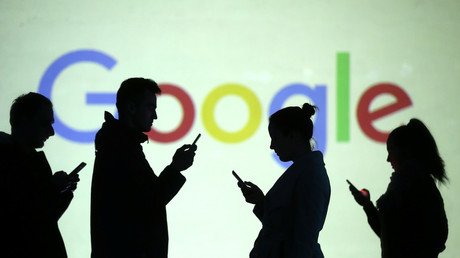Google lied about size of Pentagon AI contract, tried to hide project – leaked emails

Google misled the public about the size of the company’s contract to develop AI for the Pentagon, and its executives chose against publicizing its participation in the project, leaked emails obtained by The Intercept show.
Diane Greene, the chief executive of the company’s cloud business unit, recently told employees that revenue from Project Maven – a Pentagon program under development which aims to use artificial intelligence to help drones identify human ground targets without the assistance of human operators – was “only” for $9 million. But internal company emails from September 2017 obtained by The Intercept suggest otherwise.
One message, said to be from Aileen Black, a member of Google’s defense sales team, noted that the deal would rake in $15 million over the next 18 months. The email also said that the budget for the program was expected to eventually expand to $250 million. Black’s assessment appears to have merit: According to The Intercept, one month after news of the contract broke, the Pentagon allocated an additional $100 million to Project Maven.
The emails also show that Google executives were deeply concerned about a potential public backlash if the company’s participation in the Pentagon program became widely known.
Cofounder Sergey Brin wants Google to be a military contractor. Says it will be better *for peace* if Google does this military work rather than traditional military contractors. Google builds weapons for the Pentagon for peace. Got it? Ha-ha.
— Yasha Levine (@yashalevine) May 30, 2018
“I don’t know what would happen if the media starts picking up a theme that Google is secretly building AI weapons or AI technologies to enable weapons for the defense industry,” Dr. Fei-Fei Li, the head scientist at Google Cloud, wrote in one of the leaked emails. “This is red meat to the media to find all ways to damage Google. You probably heard Elon Musk and his comment about AI causing WW3.”
Google apparently had no concrete plan for dealing with media coverage surrounding the controversial contract, the email chain suggests. Instead, the company was seemingly hoping that the deal, which was not directly with Google, would remain hidden from the public.
“The contract is not direct with Google but through a partner (ECS) and we have terms that prevent press releases from happening without our mutual consent,” wrote Black, adding that the Defense Department “will not say anything about Google without our approval.”
However, Black warned that news of the contract will eventually get out, either through leaks or Freedom of Information Act requests. Cautioning against keeping the deal a secret, Black asked: “Wouldn’t it be best to have it released on our terms?” Despite Black’s concerns, the company didn't go public with the project until after news broke about its existence in March 2018.
In protest against the contact, more than 3,000 Google staffers signed a petition demanding that the company cancel the deal and adopt a clear policy stating that it would not participate in the development of warfare technology. Around a dozen Google employees have resigned in recent weeks in protest over the project, according to Gizmodo.
Google insists that the technology it is developing for the US military will be for “non-offensive uses only.”
Yet, in a curious move which exacerbated public outcry over Google’s participation in Project Maven, the company decided to scrub ‘don’t be evil’ – its unofficial motto – from its code of conduct. The removal occurred sometime in late April or early May, but the change was noticed only at the end of May.
Think your friends would be interested? Share this story!















